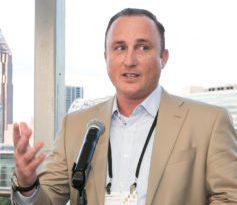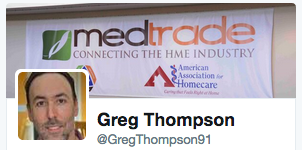SANDWICH, MA – Combining three DME entities in the middle of a global pandemic was no easy task, but Gary Sheehan (pictured) and his business partners made it happen back in April. As CEO of the newly created Spiro Health, Sheehan has navigated unusual waters over the last few months.
The first couple months he describes as “riding the wave down,” but the last 45 days have marked a bit of a rebound. “We’re now riding that wave back up,” Sheehan says, attributing most of that spark to a return of sleep referrals.
The combined entities that make up Spiro Health have operations across seven states and the District of Columbia, specifically Connecticut, Maine, Maryland, Massachusetts, New Hampshire, Rhode Island, and Virginia. In addition to the sleep referrals, patients in the northeast and other regions are again getting elective surgeries such as joint replacements that require bracing and mobility equipment.
Sheehan’s additional role as vice chair of the American Association for Homecare (AAHomecare) all but guarantees a perpetually busy schedule. At this point, it’s a way of life for Sheehan who recently took a break to chat with Medtrade Monday about legislative priorities, the relatively new merger, and reasons for the improving business situation in the northeast.

Medtrade Monday: How has the new Spiro Health venture/merger been going?
Gary Sheehan, CEO of Spiro Health, vice chair of AAHomecare, and recipient of the 2017 Van Miller Homecare Champion Award: I was hopeful that everything had been appropriately vetted and accounted for, but you don’t really know until you’re working together. It’s actually been better than we would have anticipated. There’s a lot to do, as you might imagine, bringing three systems together but we’ve got some really smart people with decades of experience. We’ve got a lot of subject matter experts, and it’s been great to be on these calls and work through really complicated issues.
Medtrade Monday: How would you describe the last month and a half?
Sheehan: In the last 45 days or so, we’ve really started to see sleep referral volume return. More patients are also getting bracing products and non-emergent care. I think we’ve kind of ridden the wave down, and are now riding it back up much like everyone else in the industry. I’m really proud of the way that that our team has responded to COVID, and treating COVID patients—renting ventilators to hospital systems and discharging COVID-positive patients home and caring for their needs. On the work flow side, we’ve been flexible working remotely. We have folks who can’t work remotely who are involved in shipping operations, and I’m really proud of the way everyone has adapted and performed throughout this unprecedented time.
Medtrade Monday: You mentioned the uptick. How much of that is a regional phenomenon?
Sheehan: Well, if anything, COVID is getting worse in some regions. There are certain regions that clearly spiked the football way before they should have, or raised the mission accomplished flag. Think about some of the things that came out of the government in Florida back in April and May—just really dangerous from a public policy point of view and they’re now suffering the consequences.
In the Northeast, we had a cautious approach—a lot of respect for science, health policy, and a very judicious approach to reopening. I’m really proud of the way Charlie Baker, the governor of Massachusetts, handled it; and several of the surrounding governors did a good job, and that has led to a very low rate of infection. So I do think that part of the uptick is geographic, because of the public policy positions that are leaders took. The people’s ability to receive non-emergent care safely and comfortably coming out of June is what we think is leading to that bump.
Medtrade Monday: As vice chair of AAHomecare, what legislative issues are on your mind?
Sheehan: The first thing on my mind is the quality of the work being done by AAHomecare. If you look at the relief packages that were pushed through back in March and April for this industry, AAHomecare’s fingerprints are all over those. The association is not intent on standing up and spiking the football in the middle of a global pandemic, but they deserve credit for the dialogue that they’ve created with CMS, and for the policy outcomes that we saw in really short order. I mean, there’s no way CMS came up with these different blended rates and provisions without significant input from the Association.
Medtrade Monday: What’s your position on delaying competitive bidding?
Sheehan: It’s entirely wrong-headed at this point to be trying to implement a competitive bidding program affecting respiratory products and home care products more broadly. It’s remarkable that the program has not been delayed as of yet. There are substantive product category impacts and there are considerations. No one was factoring in costs for PPE and increased volume of certain products, plus supply chain issues with other products. It’s critical that the industry continues to shine a light on the fact that CMS has yet to take action here. Congress did submit a letter to them with over a hundred signatures to delay the program. I think that that becomes a really critical policy initiative right now.
Medtrade Monday: Any words of wisdom for others looking to merge with other companies?
Sheehan: You need to base your alignment around culture and strategy. If you’re trying to bring things together, and they’re really disparate entities who think about things differently, you’ll end up with a really low chance of success and a high chance of friction. Pay a lot of attention to how the businesses are currently run and governed. We’re fortunate that the businesses were all healthy and growing coming into the process. If there are mild differences, I think you can work through that, but if one company for example wants to be high growth and expand their operating territory, and the other really wants to put a stake in the ground and stay where they are—that can be a problem.


